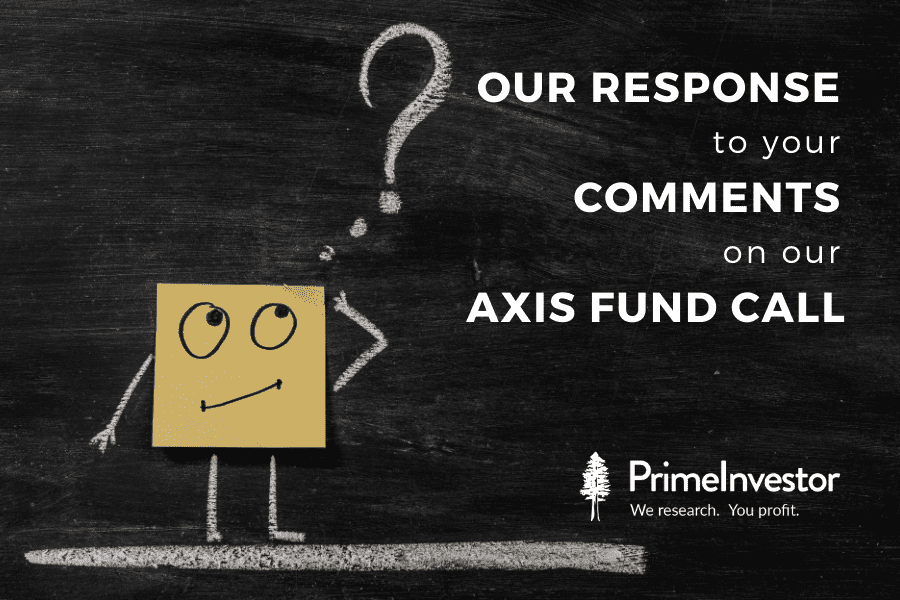We upset a few of you with our call on some of the Axis funds last week 😊 Some of you commented on the blog and others raised tickets. We thought it would be better for us to respond through an article for the benefit of others as well.
Here are a couple of sample comments from folks who seemed pretty disturbed.
“Frankly, I’m little appalled by your call “exit on Axis Smallcap”. You are not a weathercock, are you? You are an analyst. There has to be some gravity in your analysis. Yes, as an analyst you run risk of being told “why you did not warn us”, so warn if you need to. An exit call now is so premature as to promote flip-flopping. If anything, the Franklin debacle has proved that investors got fair returns on investments, albeit with protracted wait. I think you must have qualified who needs to exit and who does not rather than promote a scare among concerned investors. Do your job and your job is not scare mongering.”
“I am afraid that your analysis is half-hearted. It seems you want to stay aloof when it comes to risk”.
***
Franklin was an incident that was unfortunate to happen to debt funds in the MF industry. Prime Investor panicked and told investors to redeem even from equity funds. Are the equity funds not performing well? The funds in question with Axis MF is between 0.01% and 0.04% of the industry assets. We have seen issues with banks, corporates, etc. and the same will continue in future. Will there not be any problem with other AMCs in future? Can the regulator guarantee that all issues with AMCs be monitored stringently to ensure that no issues would arise in future? If we are scared of such risks, then retail investors should not be investing in Mutual Funds.
Please post crisp articles and give a clear message that is helpful to investors at large instead of scaring them.”
We had this and several other comments and queries. We thought we could list our responses here together.

#1 Comparing with the Franklin episode
Comparing the current Axis issue with the Franklin event, in our view, is not quite right. The governance issue involved was significantly different. Franklin was a case of an AMC reneging on the promise of liquidity that is given by any open-ended fund to a retail investor. It closed its funds without any warning or approval. It did this at a time when other AMCs were also facing the liquidity issue in the debt market.
It did this because it took credit risk across its funds, irrespective of the duration of the fund. It did this knowing liquidity can be a big risk in the Indian debt market. Yes, liquidity is a big risk that investors take in bonds. But not in mutual funds.
Next, our first call on Franklin debt funds dated back 2 months before the Franklin fiasco happened. We gave our call based on some of their funds’ exposure to Vodafone papers. It was a proactive call. Second, some of the Franklin equity funds were already a sell in our tool.
The reason we stopped rating the fund house post the event was a qualitative call, given the way the fund house had handled the issue. We did not think the fund house would close down but we did mention management change as a risk. The fund house has also lost equity fund managers since.
We had no reason to panic. We were simply using the stick we could, batting for the small investor, for what we considered as an unfair practice by an AMC – that of punishing retail investors, many of whom had their income portfolios in those schemes.
But yes, the Franklin AMC issue is indeed a good example of why exit is a good course when governance issues are flagged. Yes, people received their principal back – after a 2 year wait with marginal 3% returns after losing their liquidity! We certainly want our subscribers to have a better experience!
Axis AMC’s allegations are of a far different kind – squarely based on unethical and illegal business activity by individuals in the firm for frontrunning of stocks. A comment in our blog that said these are part of market risks is a wrong notion and should be dismissed. Mutual funds are subject to market risks. Investors do not come in fully expecting risk of fund managers frontrunning stocks!
Yes, there is a regulator to protect the investor from risk of fraudulent and unethical business practices, but no regulation is foolproof, and investors therefore end up facing risks outside of market risks. Our job as analysts is to reduce such risks post-event, where we have no way of identifying them pre-event (like we did with Franklin).
The Axis issue is not one where your money will be locked and returned later like Franklin’s. But it is one where you may lose money. You may see losses as flight of money in equity is swift in stocks where front-running is rumoured. Here, there is no question of the AMC returning such money or making good the losses – it becomes a market risk. So, the risk in Axis is that of real loss of money or loss of future returns.
#2 On our seemingly ‘hasty’ call on Axis funds
Some of your reactions range from accusing us of scaremongering, giving half hearted calls and being weathercocks 😊
First, we acknowledge (and in our recent article on our call too) the superior performance of many Axis funds. We have not issued the calls as an immediate reaction – we have deliberated much before doing so. Many of you had been writing to us from the day the event was publicized on what you should be doing, but we decided to take our time to respond.
We did this to understand outflow patterns, stock hits, performance etc. We studied the portfolios of the funds to weigh the risk in each of them as far as NAV hits from stock falls or stock liquidity issues were concerned. We considered performance in cases where performance was already showing concern. We did all this as our intention, much as you may think otherwise, is not to unnecessarily scare you or cause too much churn in your portfolio.
Second, we clearly outlined 4 risks that may emerge due to market rumours and fear, even if this does not become a full-fledged corporate governance issue. Those risks (that we have detailed in our earlier article) are:
- Redemption pressure
- Impact cost on illiquid stocks
- NAV hit from stock fall
- Poor inflows
This apart, when a fund undergoes such allegations, future inflows also get impacted. We weighed the challenges arising from this against future performance, in relation to their peers. We considered only those categories where this risk was higher. Yes, none of these risks may materialise. But when risks are evident, why get stuck with these funds when you have other options?
And therefore, our calls were to mitigate the risks in your funds. Our calls were also only on those funds where there was a higher risk of performance taking a hit. We have not made an AMC-wide call. We gave an exit call on just one fund. We moved two others to a hold. If we had half-hearted calls, we would not alert you in the first place😊In fact, it would be half-hearted if we acknowledged the risks and then asked you to decide what to do for yourself – having issued the original investment recommendation!
Whether the risks transpire or not is not something we want to assign weights to, because there isn’t enough information to do so.
But when we take these calls, we gladly prefer to err on the side of caution. At PrimeInvestor our philosophy has been to deliver returns but by first cutting down risks. Churning a portfolio and paying nominal taxes (for equity funds) is a small price to pay and it does not hurt much at a time when some profit booking is a sane thing to do in the current market environment.
We take our mission of protecting and growing investor portfolios seriously. Taking such difficult calls, when they are merited in our opinion, underscores the independence of our opinion and sincerity of our efforts.
#3 On our risk strategy and why we go against buy-and-hold
One of the questions we had was what risk management we had in place to identify such events. Honestly, we can try (not always) to identify risks in the portfolio. But frankly, to identify front-running activities is beyond our capacity as these are per se activities done without leaving much trace.
Where we can identify risks is in portfolio quality. Credit risks, poor investment decisions, concentration risks and such are somewhat identifiable. We place weights to such risks in our ratings. We do have a mechanism of identifying credit downgrades of instruments in debt funds, AUM loss, checking for liquidity in stocks of equity funds and so on. We do watch performance change and portfolio change when fund manager changes happen.
Next, on the buy-and-hold strategy – we urge you all to read what we think about this strategy here. We are not sure why there is so much furore about exit calls. Most of you ask us about profit booking when funds perform well. But when we highlight possible risks, we are accused of churning or creating a scare!
Folks, don’t get too attached to funds. Get attached to your portfolio. Compounding rewards you, as long as you stay invested. It does not treat you any better for sticking to the same fund!







30 thoughts on “Our response to your comments on our Axis fund call”
Nice article. I have exited all my axis schemes including liquid and debt funds on the day news has arrived.
Hi Vidya & Team PrimeInvestor,
Thanks for the quick call on Axis MF and this rejoinder. We have seen small investors suffering and taking the most hit when such event occurs. For me, this is a call from a group of analysts I follow and trust but the decision is purely individual. Appreciate for reiterating “to attach to the portfolio”. Continue to err on the side of caution.
Thank you for your views. Thanks! Vidya
Excellent insight
You yet again exhibit your independence and professionalism
Kudos to Prime team
Regards
🙏 thanks, Vidya
Fully agree with your earlier article on the Axis AMC risks as also the present rejoinder. You have taken a bold stand in articulating the risks in the Axis schemes and also given a clear recommendation. Pl keep up the good work of providing unbiased guidance to the small investor.
Everyone agrees there’s market/interest rate risk in MFs but one cannot factor in ‘venality of fund manager’ risk! Its shocking that quite a few well know TV commentators keep saying this has happened becos of WFH – does it mean that fund managers are such unscrupulous types who, when they know no one is looking over their shoulders, will resort to blatantly unethical stuff!
Further, people seem to be falling for FT claims that funds in all the schemes have been returned with due return. This is clever propaganda- certain schemes have not refunded the corpus and now looks like nothing more will come. Also imagine the lack of liquidity for 2 years – I know several ppl who had to break other deposits or take loans for large expenses. FT was a disaster- no other AMC froze 6 of its schemes. And to top of their inefficiancy, the top management and relatives merrily encashed their holdings just before the freeze order! And investors had to wait for borrowings to be paid back before any refunds were made- this also eroded the NAVs!
Thank you for your views sir. thanks, Vidya
Dear Team PI … Earlier Axis article was very logical response to frontrunning crisis with Axis AMC. To err on side of caution is the best strategy when it comes to high risk equity investments. The call by Team PI was only for those schemes where redemption pressure would have resulted in impact cost, due to not so easy liquidity, of some stocks. Further, any stoppage of fund flow would mean those fund would not be able to capitalise on weak market and falling indices thereby giving poor results in future.
Team PI .. Please keep erring on side of caution.. just highlight the issues that may crop up due to particular situation. Let not a few erratic reactions by some of us stop you from cautioning the investors. I am sure you have educated investors enough to take buy/sell/hold calls in conjunction with your appraisal tools.
Regards.
Jatin.
🙏 Vidya
SubraMoney, a big name in mutual fund industry substantiate the idea floated by Vidya post Axis fiasco. Link to SubraMoney YouTube video is..
https://youtu.be/sejt9QIc-T0
Despite you gave exit call only on Smallcap, I exited all. Let me sleep peacefully. There is enough mid and large cap funds available which are investible as per your MF review tool. Your call on exit of smallcap and hold on remaining funds are indeed timely. Thanks much for that. (Honestly not expected you would give exit call on smallcap fund) 🙏
🙏 Vidya
“Folks, don’t get too attached to funds. Get attached to your portfolio. Compounding rewards you, as long as you stay invested. It does not treat you any better for sticking to the same fund!”
This is the best part of the article, most of the comments(reaction) are based on the affiliation to the fund. Good article Vidya, as always!
Thank you sir 🙏 Vidya
SEBI should order such AMC not to impose any exit load on investors as this issue arises because un-ethical practice at AMC and their lack of oversight..
Fantastic article and great comeback by the team! I am glad that you stood your ground and just explained your stand in more detail. Well done.
I agree with your Articles on Axis Situation. You have done that job pretty well. Containing Risk is of paramount importance than getting 2% extra return.
I own Axis Growth Opp due to it’s 25% portfolio in Global Exposure n Fund Manager being Jinesh Gopani.
But I am taking my call not to redeem anything fm here. In fact, I am not going to stop my SIPs. In fact, this fund is 15% of my Total Portfolio, but I am holding my patience so far. This is my call for my portfolio with same conviction with which I started investment in this Fund since NFO.
Comments are closed.